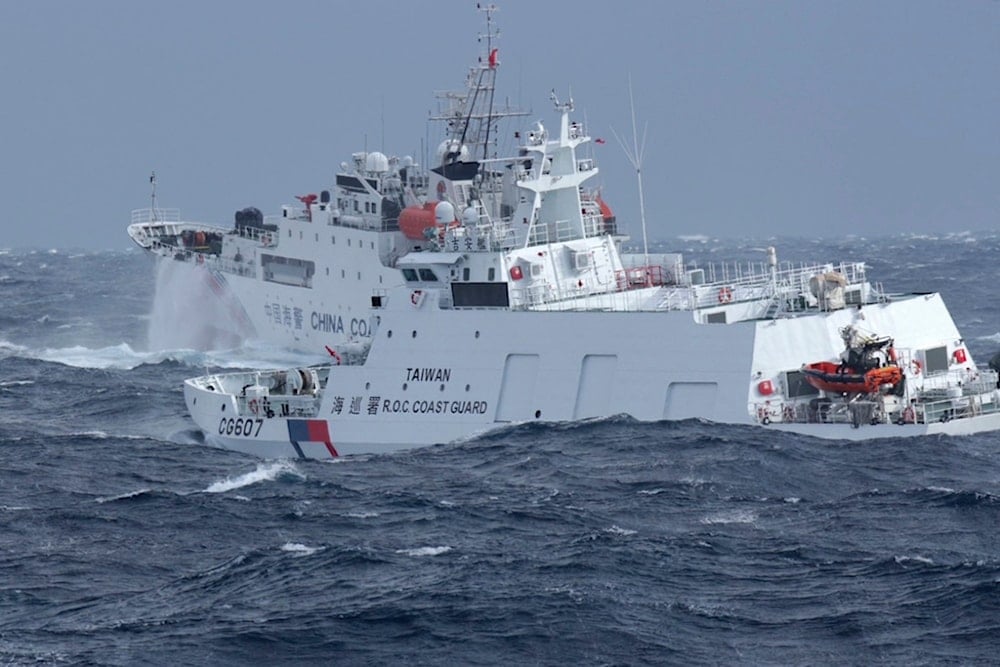US must prepare for Taiwan crisis to avert global fallout: NYT
Eyck Freymann and Hugo Bromley argue that Taiwan's critical role in global semiconductor production makes its stability essential to the global economy.
-

In this photo released by the Taiwan Coast Guard, Taiwan Coast Guard vessel Ji An, at right, chases after Chinese Coast Guard vessel 1302 off the coast of Hualien, eastern Taiwan on Thursday, December 12, 2024. (AP)
An opinion piece published in The New York Times on Tuesday by Eyck Freymann and Hugo Bromley warns of the growing threat of a US-China crisis over Taiwan, stressing the severe economic and geopolitical consequences that could result.
The authors highlight China's recent military exercises near Taiwan—the largest in nearly 30 years—as a precursor to potential conflict, including a possible full-scale invasion or a "quarantine" restricting Taiwan's trade and travel.
Citing CIA Director William Burns, the article notes that Chinese President Xi Jinping has instructed his military to prepare for an invasion of Taiwan by 2027, though these claims have never been publicly stated by Xi himself.
The authors suggest Xi might employ alternative strategies, such as deploying China's coast guard and military to assert control over Taiwan's shipping lanes, mirroring tactics used in the South China Sea.
"If China forces a confrontation over Taiwan, which Beijing claims as its own territory, the United States will need to respond decisively," the authors write, warning that such a conflict could trigger "a global economic crisis far worse than the shock caused by the COVID-19 pandemic."
The article criticizes America's current lack of preparation, referencing a House panel report from last year that concluded, "The United States lacks a contingency plan for the economic and financial impacts of conflict" with China. The authors stress that closing this gap must become a bipartisan priority.
Read more: Japan, US plan missile deployment for Taiwan contingency initiative
Semiconductor dependency, broader risks
Freymann and Bromley underline Taiwan's critical role in semiconductor manufacturing, with the Taiwan Semiconductor Manufacturing Company (TSMC) producing 90% of the world's most advanced chips.
"If Taiwanese chip production is disabled, the global economy could be plunged into a deep slump," the authors warn. They further caution that if China gains control of TSMC, it could leverage the technology to dominate artificial intelligence and other critical industries.
The potential fallout extends beyond semiconductors, as the authors emphasize the importance of two commitments underpinning the Indo-Pacific economic order: the US pledge in the Taiwan Relations Act of 1979 to oppose threats to Taiwan's autonomy and China's 1982 promise to pursue reunification through peaceful means.
They argue that a failure by the US to respond decisively would embolden China and weaken trust among key allies like Japan, South Korea, and Australia.
Strategic recommendations
The authors reject sweeping sanctions as a viable response, pointing out that such measures could "undermine the international economic system that the US is uniquely positioned to protect." Instead, they propose a proactive strategy based on three key elements:
- Creating an Economic Security Cooperation Board to stabilize financial markets and enforce trade policies aligned with national security.
- Accelerating the reshoring of critical supply chains, such as pharmaceuticals and drones, to reduce dependence on China.
- Implementing gradual tariffs on nonessential Chinese goods to encourage diversification without causing sudden inflationary shocks.
While acknowledging that these measures would invite Chinese retaliation, the authors argue that a comprehensive economic framework is essential to counter China's potential coercive tactics and maintain global stability.
Read more: China sanctions military firms, executives over US weapons to Taiwan
A call for urgent action
Freymann and Bromley call on US policymakers to act preemptively by holding congressional hearings on the economic implications of a Taiwan crisis and preparing legislation to address such scenarios.
"If China invades or quarantines Taiwan, it wouldn't just be targeting one island nation. It would be seeking to forcibly reshape the Indo-Pacific regional order and undermine the rules-based global economy," the authors conclude.
"Without a plan, a Taiwan crisis risks undermining the foundations of American prosperity and security."

 4 Min Read
4 Min Read








